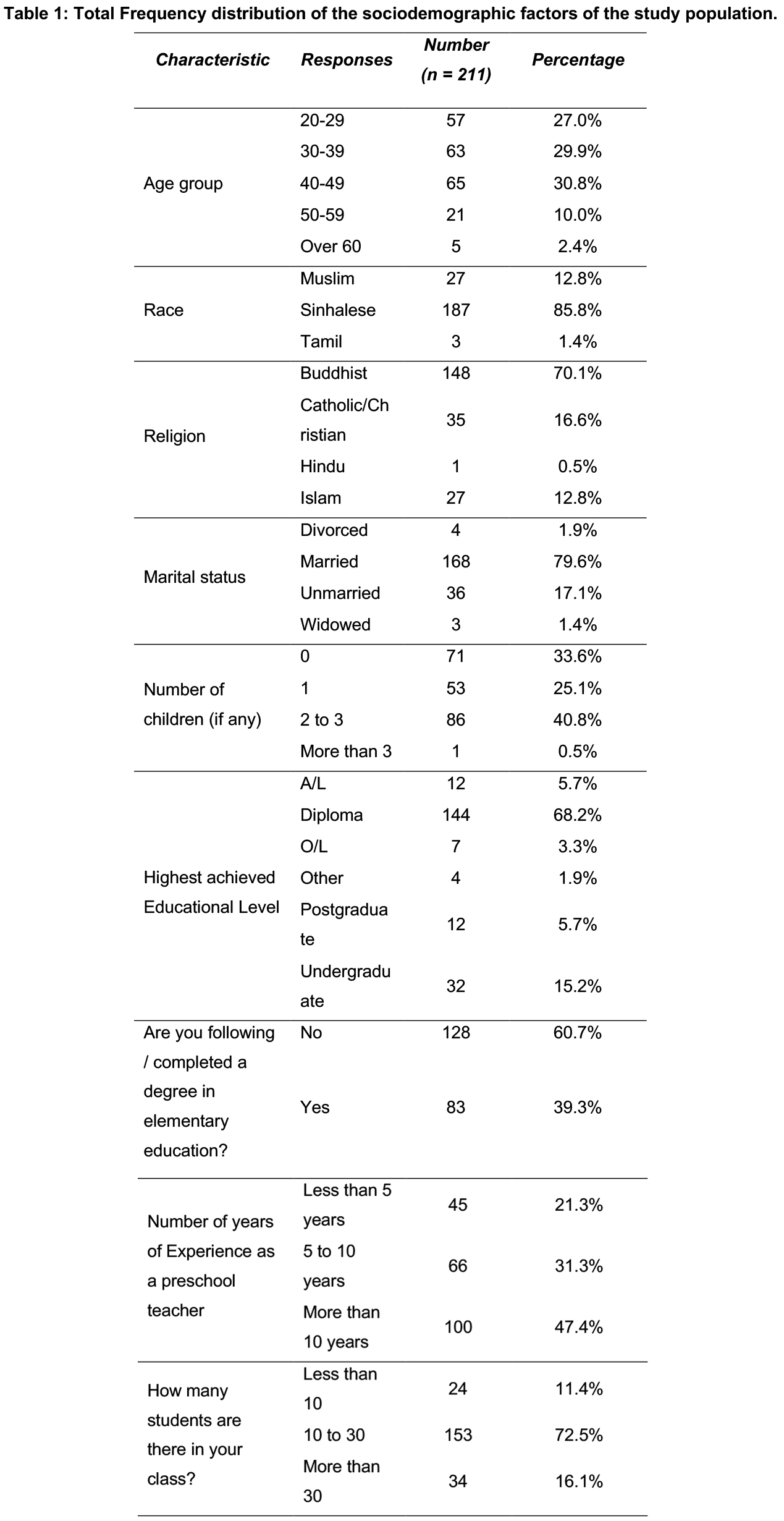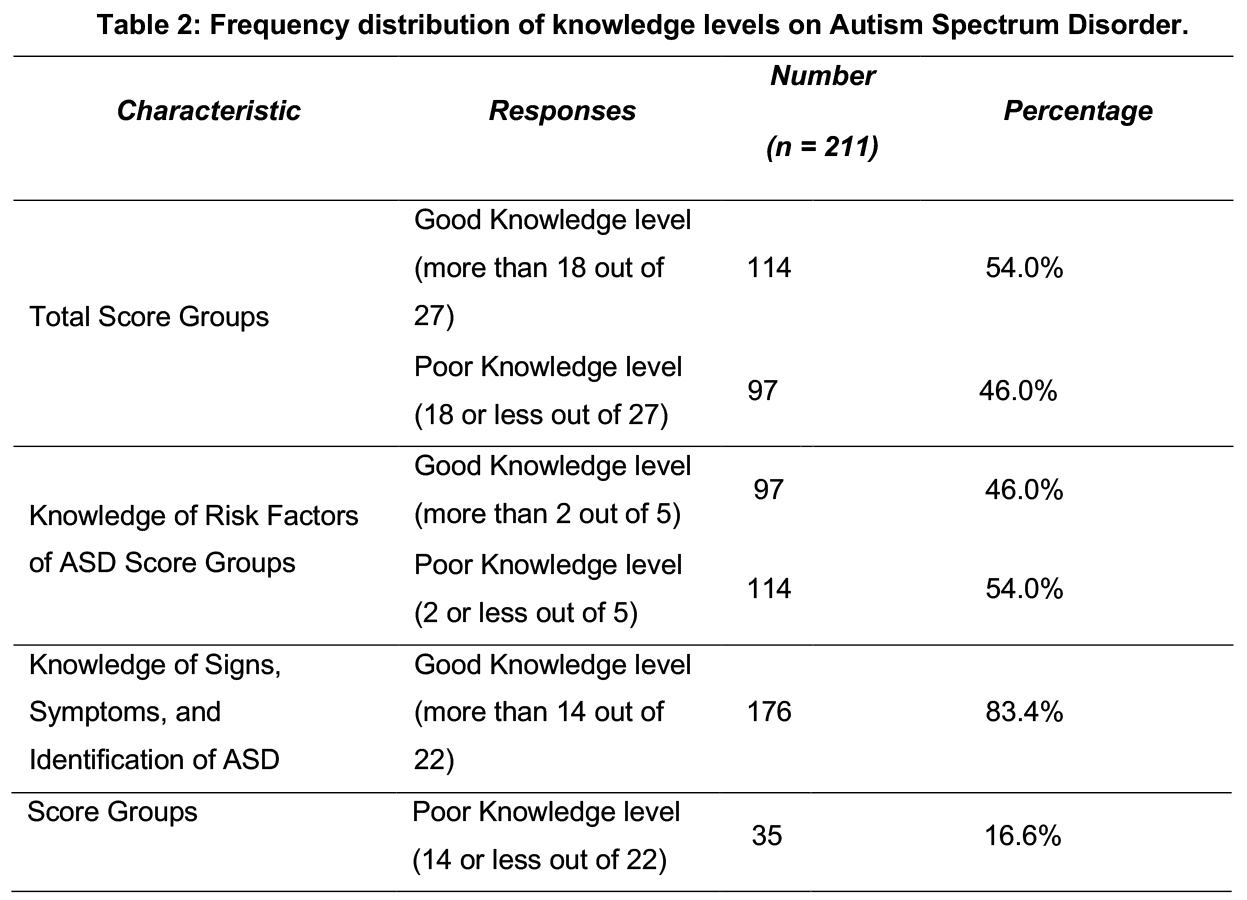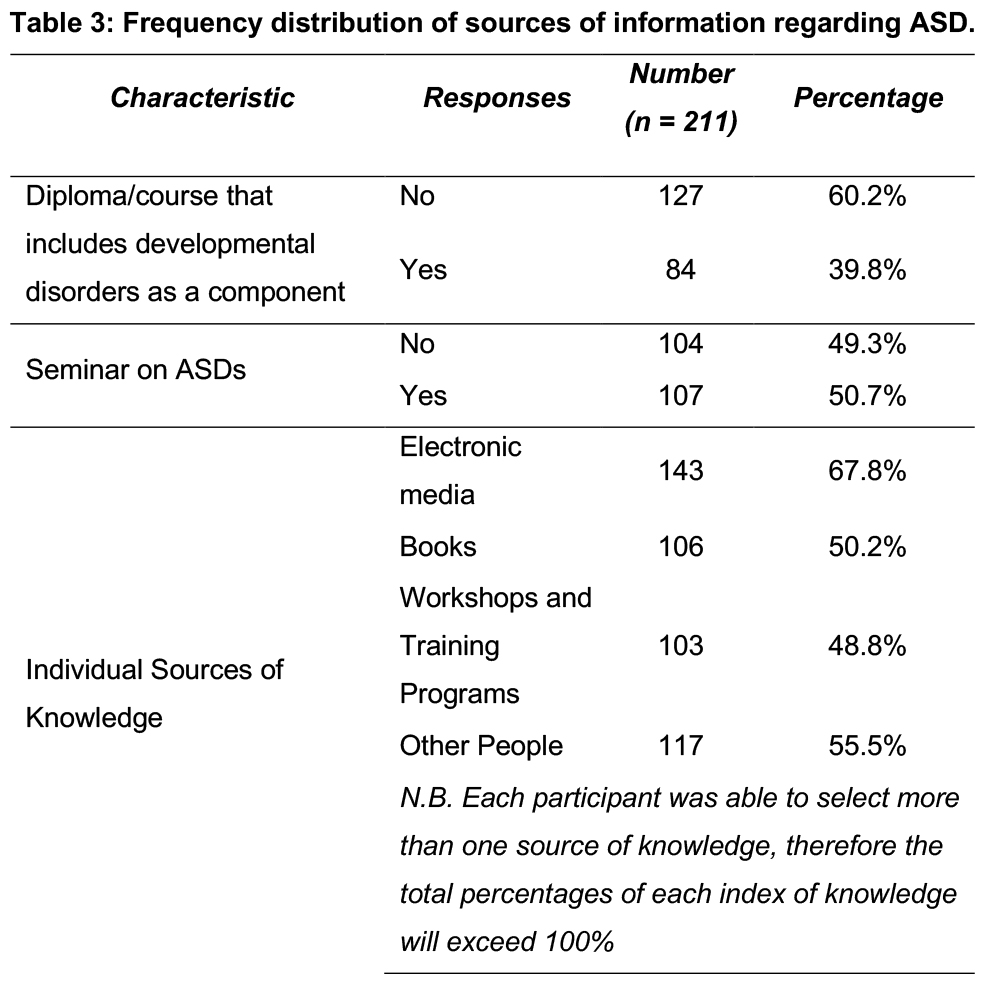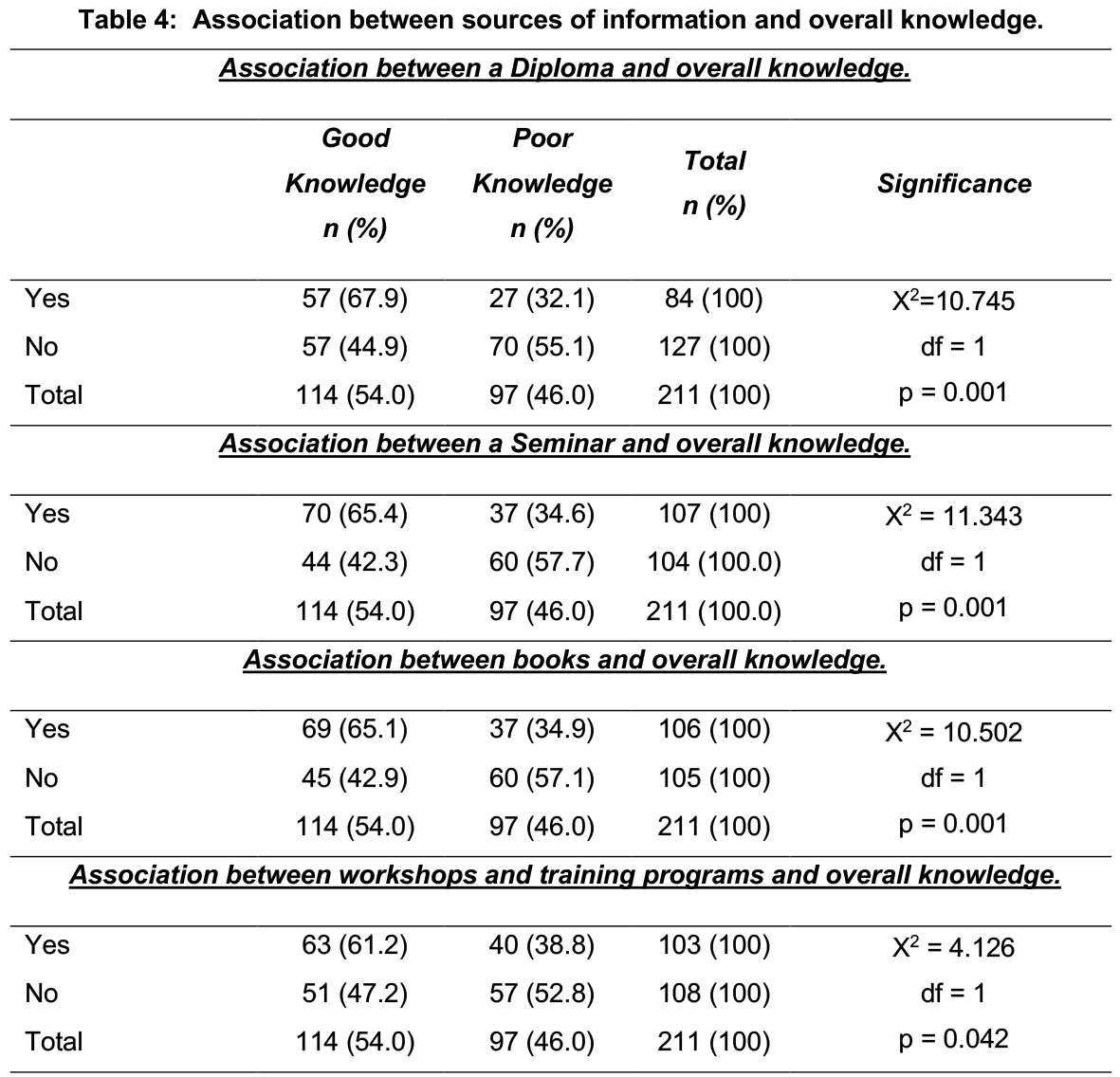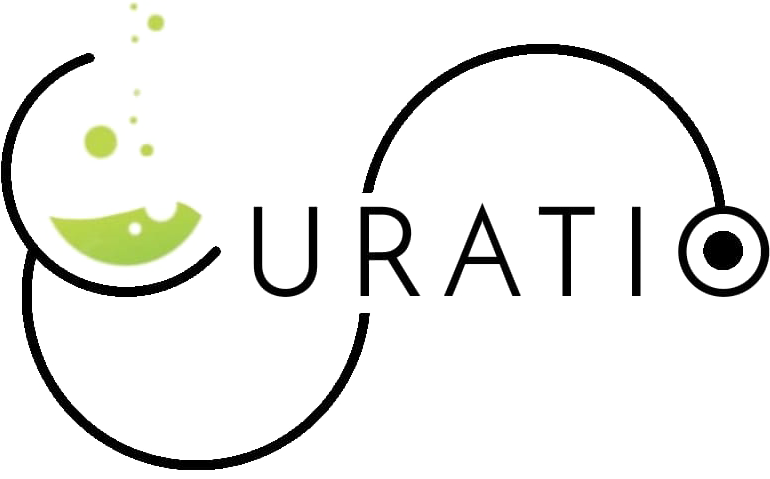
Medical Journal
Published by
Faculty of Medical Sciences,
University of Sri Jayewardenepura,
Nugegoda,
Sri Lanka.
Original Articles
Knowledge and Associated Factors of Knowledge on Autism Spectrum Disorder Among Preschool Educators in Colombo, Sri Lanka
Gunawardena L G A S*1, Perera M N.1, Premadasa C Y.1, Gunawardana D I1, Fernando H M1, Senaratna C2, Wijesekara S2
1Faculty of Medical Sciences University of Sri Jayewardenepura, Sri Lanka.
2Department of Community Medicine, Faculty of Medical Sciences, University of Sri Jayewardenepura, Sri Lanka.
3Department of Paediatrics, Faculty of Medical Sciences, University of Sri Jayewardenepura, Sri Lanka.
*avindya96@gmail.com
Abstract
Background: Autism spectrum disorder (ASD) are increasingly prevalent condition in the modern world in which early diagnosis and commencement of therapy are shown to be effective in the management of symptoms. Preschool teachers can play an important role in the identification of children affected by ASD as symptoms start around the age of 3.
Objective: To describe the knowledge, sources of information and associated factors of knowledge on Autism Spectrum Disorder among preschool teachers in the Colombo District.
Methods: A cross-sectional descriptive study was conducted to determine the knowledge level of 211 preschool teachers, who were selected using cluster sampling, in the Colombo District, Sri Lanka. A self-administered questionnaire was distributed via a Google form. Data was analysed using SPSS software version 26.0. The significant level was set at 5%.
Results: 114 (54%) teachers had a good level of overall knowledge of ASD. The factors: Diplomas, seminars, books, workshops and training programs on ASD and other developmental disorders had shown a statistically significant association with adequate knowledge (p<0.05).
Conclusion: Based on the findings, it can be concluded that a significant proportion of teachers demonstrate a good overall knowledge of Autism Spectrum Disorder (ASD). These results underscore the importance of continuous professional development and targeted educational interventions for teachers to enhance their understanding and support for students with ASD in educational settings.
Introduction
Autism Spectrum Disorders (ASD) are a group of neurodevelopmental characterized by a certain degree of impaired social behaviour and language and communication skills. According to the World Health Organization (WHO), the current rate of ASD in the world is about 1 in 160. A study done by Perera et al. 2009, has found that 1 in 93 children with a prevalence of 1.07% are affected with ASD in Sri Lanka between 18 and 24 months. While the cause of ASD is not properly understood, risk factors include genetics, environmental factors like nutrition, pollution and toxins, and the male gender. Past study results have proved that there is a significant hereditary influence regarding cognitive functional defects including Autism (Folstein and Rutter 1977). Obstetric and perinatal hazards also contribute to the development of ASD, but those events are not independent and they are always associated with underlying abnormal genetic development (Bailey A et al. 1995). ASDs affect males more than females, as several sex chromosomal genes and hormonal factors may be contributing factors. Especially the testosterone hormone may cause the occurrence of the autistic phenotype. (Donna and Daniel 2013).
ASD symptoms typically appear by age two or three, worsening without proper management. Key signs include lack of eye contact, unusual speech patterns, language delays, and repetitive behaviours like stacking objects.
Contrary to myths, ASD isn’t a learning disability; many individuals have above average intelligence quotient (IQ) and excel in various subjects. Misconceptions about its causes, such as bad parenting or vaccines, have been debunked by research, showing no link between vaccinations like measles, mumps, and rubella vaccine and autism. (Taylor B et al. 2002).
The prognosis for children with ASD varies based on IQ level. Those with lower IQs may struggle to live independently, while higher- functioning individuals may achieve independence. However, even with improvement, ASD doesn’t mean complete mental health or social adaptation due to potential neuropsychiatric comorbidities post recovery. (Helt M et al. 2008).
The onset of this developmental disability may persist since infancy (Peter Szatmari 2003) Usually, it is a lifelong disorder. While as of today there is not a definitive cure for ASD and the condition is a lifelong burden, early detection and management play a major role in creating a good quality of life for these children. Diagnosis is based on the history and analysis of behaviour. It can be done using screening methods, such as the Modified Checklist for Autism in Toddlers (MCHAT), (Baron, Allen and Gillberg 1992). Special education programs and behavioural and communication therapy have been shown to help children acquire communication and social skills and reduce the severity of symptoms. It will reduce the long term issues, prevent worsening the symptoms and provide much time for the improvement of the well-being of the children. (Jennifer Harrison Elder et al. 2017).
Methodology
A descriptive cross-sectional study was conducted to determine the knowledge on Autism Spectrum Disorder (ASD) among preschool teachers, the sources of knowledge and the factors associated with knowledge on ASD among preschool teachers.
This study was conducted among preschool teachers in selected pre-schools in Colombo District.
Inclusion Criteria
Pre-school teachers in the Colombo District who are fluent in either Sinhala or English.
Exclusion Criteria
Pre-school teachers who do not have access to internet facilities. Sample size – 239
Sampling Technique:
Ethical clearance for the study was obtained from the ethics review committee of the Faculty of Medical Sciences, University of Sri Jayewardenepura. Further, administrative clearance was secured by the principals and/or Persons in charge of each pre-school.
A list of all the preschools (1013 in number) in the Colombo district was obtained and 55 preschools were selected from this list by simple random sampling using computer generated random numbers. Then from each preschool, a maximum of 5 teachers were randomly selected for the study (overall the sampling technique was cluster sampling.) 240 preschool teachers were contacted and asked to take part in the study. Of these 240 teachers, 29 were excluded from the study according to the exclusion criteria and inappropriate responses. Data from 211 teachers were taken for the study.
Data from the questionnaire was entered into a single database and analysed, using SPSS software. Range checks and customs checks were performed to ensure the accuracy of data. Univariate and multivariate tables have been presented with appropriate statistical tests.
The knowledge was assessed under 3 sections: Knowledge regarding Risk Factors, Knowledge regarding Signs, Symptoms, and Identification of ASD and overall knowledge. The knowledge levels were determined as follows.
For Knowledge regarding Risk Factors, a score of 3 or higher out of 5 was considered as a good knowledge level.
Knowledge regarding Signs, Symptoms, and Identification of ASD, a score of 15 or higher out of 22 was considered as a good knowledge level.
Overall knowledge was taken as the sum of these two components of knowledge. An overall knowledge of 18 or higher out of 27 was considered a good knowledge level.
The association of each variable with the knowledge regarding risk factors of ASD, with the knowledge regarding the signs, symptoms, and features of ASD and with the overall knowledge regarding ASD were assessed using a chi-squared test for categorical variables and t-test for numerical variables.
Results
Sociodemographic and teaching experiencer elated factors of the study population.
Considering the age groups of the participants, the majority (30.8%) of the preschool teachers were in the “40 – 49” years category, 187 (85.8%.) teachers were Sinhalese and 148 (70.1%) were Buddhists, 168 (79.6%) were married, 140 (66.4 %) had children.
The highest achieved educational level of most of the teachers was a diploma (68.2%). Out of the study sample, only 39.3% of the teachers stated that they are following or completed a degree in elementary education. The majority of the teachers (52.6%) had less than 10 years of experience as a preschool teacher. The majority of the teachers (72.5%) stated that there are 10–30 students in their class.
We decided to disregard gender as a variable as out of 211 participants, 209 (99.05%) of them were female, 1 (0.47%) was male and 1 (0.47%) preferred not to state the gender. Since the counts of the “Male” and “Prefer not to say” are negligible compared to the count for “Female”, this variable was removed from the study.
Knowledge
Ninety seven (46%) teachers had good knowledge regarding risk factors of ASD and 176 (83.4%) had a good knowledge level regarding the signs, symptoms, and identification features of ASD.
Therefore 114 (54%) teachers had a good level of overall knowledge on ASD.
Sources of information
Regarding sources of knowledge that preschool teachers have obtained their knowledge on ASD, most teachers are neither following nor have followed a diploma/course that includes developmental disorders as a component. However, 107 of the teachers (50.7%) of the study population have attended at least one seminar on ASD.
Regarding the individual sources of knowledge that they have gained their knowledge on ASD, electronic media is the source of knowledge for the majority for 67.8%) of teachers in this study population. While 50.2% (106) of the population gained their knowledge from books, 48.8% from workshops and training programs and 55.5% (117) from other people.
Factors associated with the knowledge of ASD.
Teachers who have followed or are following a diploma that includes developmental disorders have a good knowledge level (67.9%) compared to the teachers who have not followed or are not following a diploma. There was a significant association (p =0.001) between following or following such a diploma and the overall knowledge regarding ASD.
In addition, more teachers who have attended a seminar on ASD had a good knowledge level (65.4%) compared to teachers who have not attended any seminar on ASD. There was a statistically significant association (p = 0.001) between having attended a seminar on ASD and overall Knowledge.
Considering overall knowledge of ASD, more teachers who have gained knowledge from books had a good knowledge level (65.1%) compared to teachers who have not used books. There was a statistically significant association (p = 0.001) between being informed of ASD through books and overall knowledge of ASD.
In addition, more teachers who have gained knowledge from workshops and training programs had a good knowledge level (61.2%) compared to teachers who have not attended workshops and training programs. There was a statistically significant association (p = 0.042) between being informed of ASD through attending workshops and training programs and overall knowledge of ASD.
Discussion
The objectives of this study were to determine the knowledge level of preschool teachers and to describe the sources of knowledge and the factors associated with this knowledge. Accordingly, a descriptive cross-sectional study was carried out with cluster sampling using a self-administered online questionnaire. A sample size of 211 was acquired.
The Knowledge of Autism Spectrum Disorder
In this study out of 211 preschool teachers 114 (54%), teachers had a good level of overall knowledge of ASD, 94 (46%) had good knowledge regarding risk factors of ASD and 176 (83.4%) had a good knowledge level regarding the signs, symptoms, and identification features of ASD (Table 2). In comparison to this research, studies done by Lui et al (2016) in China, and Ayoka (2018) in Ghana found that preschool teachers had a low knowledge level regarding ASD and studies done by Drusch (2015) in the USA and Taresh et al (2020) in Yemen found that preschool teachers had a moderate knowledge level regarding ASD.
The 33 difference Is the socio-demographic factors as each of the above studies was carried out in different countries. Additionally, except for the study carried out by Lui et al (2016) in China (in which the sample size was 471), the other studies had significantly lower sample sizes than ours. The unreliability of studies with low sample sizes could account for the difference in knowledge levels.
The sources of knowledge and other factors associated with the knowledge on ASD.
It was found that there is a statistically significant association between following or following a Diploma that includes developmental disorders and overall knowledge. According to the study result majority (67.90%) of teachers who have followed or followed a diploma that includes developmental disorders had a good knowledge level compared to the teachers who have not followed a diploma (42.3%) (Table 4). Similar results were found in a study carried out in Yemen by Taresh et al in 2019. They also found that teachers who had a diploma had a higher level of knowledge compared to teachers with bachelor’s degrees and high school degrees.
Other than that, it was found that a significantly higher proportion of preschool teachers who had attended a seminar on ASD (65.4%) had good knowledge of ASD when compared to the preschool teachers who had not attended to seminar on ASD (42.3%) (Table 4).
So, we can suggest that following of Diploma and attending a seminar about ASD and other developmental disorders will be helpful to them to improve their knowledge of ASD leading to better identification of children with ASD.
Regarding the individual sources of knowledge that they have gained their knowledge on ASD, electronic media is the source of knowledge for the majority (67.8%) of teachers in this study population. 50.2% (106) of the population gained their knowledge from books, 48.8% from workshops and training programs and 55.5% (117) from other people (Table 3). Electronic media was the most popular source of information. A similar result was obtained in a study carried out by Arif et al. 2013 in Pakistan where 55.3% of the teachers used electronic media as a source of information.
Books and workshops/training programs as sources of information on ASD showed statistically significant associations with overall knowledge. (Table 4). According to the above results, we can assume that there is a significant probability of gaining knowledge from books and workshops/training programs about ASD.
While electronic media (Television, radio and the internet) was the most popular source of information there was no significant association between electronic media as a source of knowledge and the overall knowledge level.
So, we can conclude that electronic media is an ineffective medium of educating people when compared to books, seminars, workshops, and training programs. One significant reason for this perception could be the challenge of distinguishing reliable sources from unreliable ones in electronic media platforms. This difficulty may undermine the credibility and educational impact of information disseminated through electronic media channels.
In our study, statistically significant associations were not found between sociodemographic factors and overall knowledge.
Acknowledgement
We would like to express our sincere gratitude to all the participants who gave their kind support for the research by responding to the online questionnaire. We were able to successfully conduct the research due to their volunteer participation and kind contribution for the well-being of the children with ASD.
Keywords
Autism, Autism Spectrum Disorder, Preschool teachers.
Conflict of Interest
No potential conflicts of interest were reported by the authors.
Abbreviations
ASD – Autism Spectrum Disorder
IQ – Intelligence Quotient
References
- Arif, M.M., Niazy, A., Hassan, B. and Ahmed, F., 2013. Awareness of autism in primary school teachers. Autism Research and Treatment, 2013.
- Ayoka, G.I.F.T.Y., 2018. Knowledge Levels of Pre-School Teachers on Autism Spectrum Disorder (ASD) in Selected Schools in Adentan and Madina Municipalities (Doctoral dissertation, University of Ghana).
- Bailey A, Le Couteur A, Gottesman I, Bolton P, Simonoff E, Yuzda E. Autism as a strongly genetic disorder evidence from a British twin study. Psychol Med. 1995;25:63–77.
- Baron-Cohen S, Allen J, Gillberg C, Can autism be detected at 18 months? The needle, the haystack, and the CHAT Br J Psychiatry. 1992 Dec;161:839-43.
- Donna M Werling, Daniel H Geschwind (2013). Sex differences in autism spectrum disorders.
- Drusch, S.J., 2015. The Early Identification of Autism Spectrum Disorder in Preschool Settings.
- Folstein S, Rutter M. Infantile autism: A study of 21 twin pairs. J Child Psychol Psychiatry.1977;18:297–321.
- Helt M, Kelley E, Kinsbourne M, et al. Can children with autism recover? If so, how? 2008;18:339–66.
- Jennifer Harrison Elder, Consuelo Maun Kreider,2 Susan N Brasher,3 and Margaret Ansell4 , Clinical impact of early diagnosis of autism on the prognosis and parent-child relationships. Psychol Res Behav Manag. 2017; 10: 283–292.
- Liu, Y., Li, J., Zheng, Q., Zaroff, C.M., Hall, B.J., Li, X. and Hao, Y., 2016. Knowledge, attitudes, and perceptions of autism spectrum disorder in a stratified sampling of preschool teachers in China.
- BM Psychiatry, 16(1), p.142.
- Perera, H., Wijewardena, K. and Aluthwelage, R., 2009. Screening of 18–24-month-old children for autism in a semi-urban community in Sri Lanka. Journal of Tropical Pediatrics, 55(6), pp.402405.
- Peter Szamtmari. The causes of autism spectrum disorders. BMJ. 2003 Jan 25; 326(7382): 173– 174.
- Taresh, S., Ahmad, N.A., Roslan, S., Ma’rof, A.M. and Zaid, S., 2020. Pre- School Teachers’ Knowledge, Belief, Identification Skills, and Self-Efficacy in Identifying Autism Spectrum Disorder (ASD): A Conceptual Framework to Identify Children with ASD. Brain Sciences, 10(3), p.165.
- Taresh, S.M., Ahmad, N.A., Roslan, S. and Ma’rof, A.M., 2019, December. Knowledge in Autism Spectrum Disorder (ASD) among Pre-School Teachers in Yemen. In 3rd International Conference on Special Education (ICSE 2019). Atlantis Press.
- Taylor B, Miller E, Lingam R, Andrews N, Simmons A, Stowe J. Measles, mumps, and rubella vaccination and bowel problems or developmental regression in children with the autism population-based study. 2002;324:393–396.

